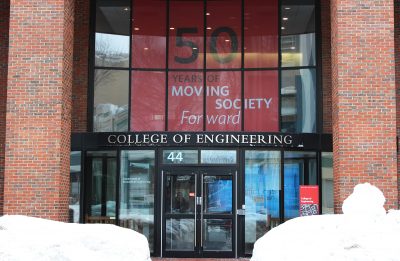
Boston University’s College of Engineering announced Tuesday it received a $3.36 million grant to develop new smart car technology, according to a press release from the university. The Oak Ridge National Laboratory of the U.S. Department of Energy granted the funds.
The grant’s recipients in ENG are working on a project that focuses on building a connected and autonomous community among cars on the road, while increasing vehicle energy efficiency by 20 percent, ENG professor Christos Cassandras said.
Cassandras, who leads BU’s team on the project, said the end goal for the project is to have cars that are self-driven, but require a person to be in the car. In order to do this while keeping the roads safe, the cars need to be able to “talk” with one another, he said.
“The main goal of this particular project, which is joint with other universities, industries and the … government [research] lab, is to build a smart car,” Cassandros said. “Ultimately, we’re trying to create … an internet of cars, where the cars are the entities that react with each other and exchange information.”
While safety is important, Cassandras said the main goal of the project is energy efficiency.
“Ultimately, if we do that, then we’ll be able to drive safer,” he said.
Graduate students from ENG will be heavily involved with the project, and their work will focus on the theoretical connectivity of the cars, Cassandras said.
“A lot of the effort that the graduate students are going to put into is going to be on simulations of test destinations,” he said. “We simulate how cars are driven, and in our case, we’ll develop algorithms so that if, for example, in the extreme case, all of the cars in the roads were these self-driving cars, [we want to know] how do they talk to each other, how do they manage to cross intersections without hitting each other.”
When developed, the project will be tested at the University of Michigan’s “Mcity,” a test bed that is set up like a small city’s roads, Cassandras said.
Andreas Malikopoulos, a fellow at the Oak Ridge National Laboratory, said his previous work with Cassandras is why the laboratory chose BU as the grant’s recipient.
“Professor Cassandras and I have been working together in this area for quite some time,” Malikopoulos wrote in an email. “Over the past few years, Professor Cassandras has been collaborating with the City of Boston and the Boston Region Metropolitan Planning Organization on various ‘smart city’ projects focusing on energy and transportation issues.”
Several ENG students said while they were excited by the sizable grant, they are proud to see ENG is developing such innovative technology.
Thor Breitbarth, a freshman, said he’s glad to see ENG working to bring the long-imagined internet of cars to fruition.
“I remember seeing some hypothetical thing about an internet of cars to reduce traffic on the Discovery Channel when I was like seven,” Breitbarth said. “It’s pretty cool that a professor at BU is actually making that a reality.”
Alejandra Flores, a junior, said this project will be helpful and useful to urban areas like Boston.
“It’s going to be an improvement to the roads of Boston just because there’s a lot of traffic jams,” Flores said. “There’s not as many lanes, especially in cities.”
Nicholas Tortora, a freshman, said this project reminds people that the government is, in fact, interested in the environment.
“I think that it’s good that the government gave this grant,” Tortora said. “It shows that the government is interested in reducing both traffic volume, relieving some stress in everyday life and helping the environment, which is something people were worried that government isn’t interested in anymore.”





















































































































